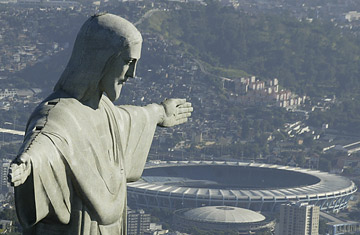
Brazil has been awarded the right to host the 2014 soccer World Cup after a FIFA executive committee meeting on Tuesday in Zurich.
The announcement that Brazil will host the 2014 World Cup is the one that fans around the globe wanted to hear. Brazil, after all, is the spiritual home of the beautiful game. It boasts the greatest players (Pele, Zico, Ronaldinho), the most fabled stadium (the Maracanã), and a trophy room that is the envy of its rivals (an unequaled five World Cup titles).
Unfortunately, what it also has is an infrastructure woefully unprepared to host such an event, a questionable ability for long-term planning, and a political class riddled with people who see such opportunities less as a way to build a nation than as a chance to line their own pockets.
"I feel more worry than joy," said Juca Kfouri, a journalist known for his crusades against corruption inside the game. "We can do it. We are able to do it. But only if we are serious and the public cost is monitored. Otherwise it will be a succession of scandals."
Brazil was chosen at the FIFA Congress in Switzerland not because its bid was stronger than those of others, but because of politics and emotion. Under FIFA's rotation policy — which is to be abandoned when considering venues for future tournaments — different continents host the World Cup in succession. The 2014 tournament was the turn of Latin America, and its nations threw their weight behind Brazil to make it the sole candidate. Brazil has hosted the tournament only once before, in 1950, and many felt it deserved another opportunity given its vast contributions to the game and the massive worldwide popularity of its players.
Still, perhaps aware of the doubts, President Luiz Inacio Lula da Silva went to Zurich for the FIFA decision, and on hearing the confirmation, he told the gathered dignitaries, "Rest assured that Brazil will know how to proudly do its homework and host a World Cup."
Brazilian authorities have pointed to their successful staging of the Pan American Games in Rio de Janeiro in July and August as proof that Brazil can host a major sporting event. But critics pointed out that the Games left almost no legacy for the run-down city by the sea.
The promised extension of the subway system to the hub of the Pan American Games was shelved soon after Rio won the bid. The event brought no major improvements to the city's road or hotel infrastructure, and security improvements were temporary, with the thousands of troops drafted to protect visitors from the violence that engulfs the city's 600-odd favela slums departing soon after the games ended.
FIFA's inspectors glossed over those points in their report, at times embarrassingly so. More than 6,000 people are shot dead each year in Rio alone, and police seem unable to halt the bloodshed. In fact, militias composed of former cops appear to be responsible for some of it. But on the security situation, the FIFA report simply states that the "authorities have the know-how and resources to improve the situation before 2014."
The report also states that "air and urban transport infrastructure would comfortably meet the demands of the 2014 World Cup." This in spite of an almost total breakdown in the air traffic control system that over the last year contributed to two fatal crashes — one of which was the biggest in Brazilian history — and monumental chaos at airports.
"Either the FIFA inspectors landed in another country thinking it was Brazil or the initial report is a practical joke," wrote Eduardo Tironi in Lance, the country's best-selling sports newspaper.
So, while fans across the world dream of coming to Brazil seven years from now to see their heroes up close in what is one of the most beautiful and hospitable nations on earth, Brazilians will be hoping that their leaders get it together to stage a tournament of which the country can be proud.
